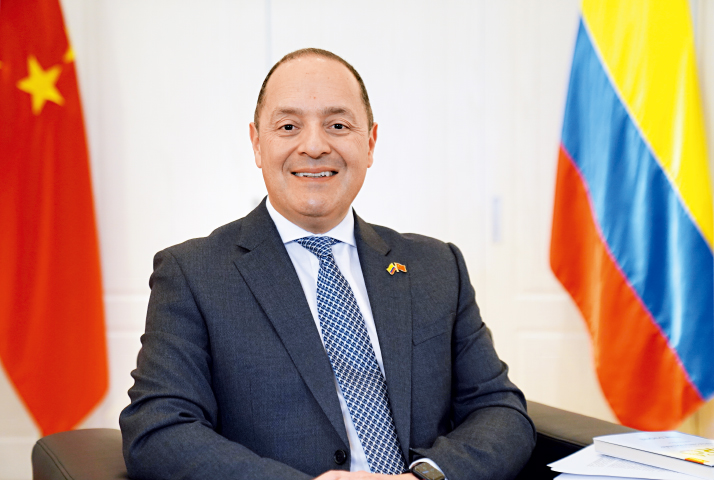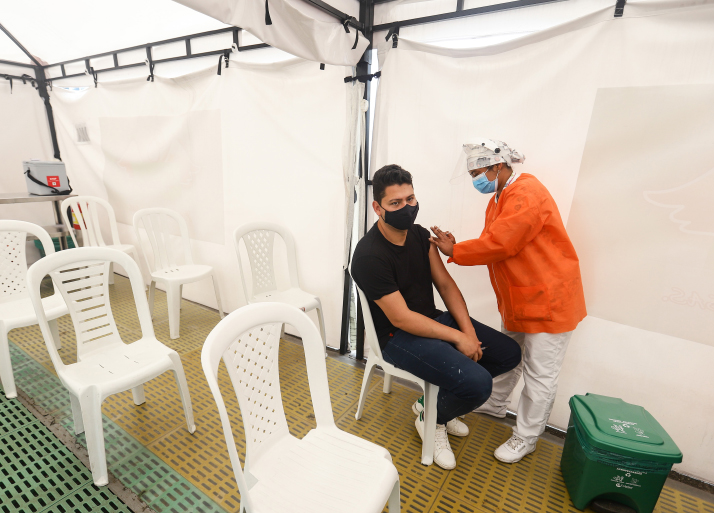| Voice |
| Colombian ambassador to China reflects on his three-year tenure | |
|
|
 Colombian Ambassador to China Luis Diego Monsalve (ZHANG WEI)
As his mission draws to an end, Colombian Ambassador Luis Diego Monsalve reflects on his three years in China, marked by the fight against COVID-19 and a greater rapport between the two countries, in an interview with Michael Zárate, Associate Executive Editor of China Hoy, a Spanish monthly published by China International Communications Group. Edited excerpts of their conversation follow: China Hoy: How has the relationship between Colombia and China evolved during your tenure as ambassador to China? Luis Diego Monsalve: Despite difficulties, it has been a very interesting period. I arrived here in early 2019. That year was very important because President Iván Duque paid a state visit to China. His itinerary included several very important meetings at the government level, especially the one with President Xi Jinping, following which agreements in multiple fields were signed. President Duque has stated on several occasions that the relationship between both countries is at its highest point. This was further demonstrated last year when President Xi sent a video message to Colombia [as COVID-19 vaccines provided by China arrived in Bogotá, the Colombian capital]. The economic aspect of the relationship is obviously highly important and we have managed to introduce a number of new products to the Chinese market. One such product that China started to import from Colombia was the avocado; Colombian coffee has also been on Chinese shelves for several years now, allowing consumers to get to know and taste our different products. Another highlight was bringing Chinese companies closer to Colombia, mainly investment-wise. Chinese businesses in the infrastructure, transportation and energy sectors are investing in, and executing, projects worldwide. Colombia used to be a relatively distant country with very little investment, but these three years have been wonderful because Chinese companies have started participating in giant projects, the main one being the Bogotá Metro. We have forged a great economic proximity to China.  A resident in Bogotá, Colombia, receives a Chinese COVID-19 vaccine on September 16, 2021 (XINHUA)
Your mission in China has been marked by the fight against COVID-19. What do you think of this difficult period? It has been a very complex period, indeed. Throughout my first 10 months in office, I was able to move around a lot more. I accompanied delegations on many visits, including that of President Duque. I also traveled with ministers, business people and many other people from Colombia who came to China. Then, as was the case all over the world, the virus arrived in Colombia and we obviously found ourselves facing very difficult circumstances. As the idiom goes, "A friend in need is a friend indeed." We began receiving a lot of support from China and reached important COVID-19 vaccine agreements with [Beijing-based pharmaceutical company] Sinovac. As a matter of fact, 60 to 70 percent of the vaccines Colombians received came directly from China and they helped save many lives. As a result of the pandemic, we took many of our events online. Since my first year in office, we have been doing Coffee With the Ambassador, an event that has since made its way into many Colombian embassies around the world. We invited a group of business people to talk about a specific topic and, due to the pandemic, we turned it virtual. Overall, the pandemic was a difficult but equally interesting experience. The first round of Colombia's presidential election will take place on May 29. Has the country's political spectrum managed to reach consensus on its relationship with China? More and more Colombians are beginning to understand China's importance in the global arena. It is the second largest economy worldwide today and will grow into the largest one in the coming years. It is a country with an open economy that complements our own market very well. Colombia and the rest of Latin America can help meet China's needs, especially in the agricultural and food sectors. We, on the other hand, require a lot of investment, technology and infrastructure, which Chinese companies can provide. I therefore think that this relationship, which is interconnected and can benefit both parties, will continue regardless of what happens in the next elections. Last January, President Duque said that tourism had become the "new Colombian oil." How will Colombia pique the interest of Chinese travelers? Colombia has one very big advantage. It is a mountainous country, but at the same time it has jungles, plains, coffee regions and the Sierra Nevada de Santa Marta, which is a beautiful and biodiverse area. We have a lot to offer in terms of nature tourism, which I think will become more important after the pandemic. We will obviously have to promote the country because we are far removed from China in geographical terms, but we are collaborating with neighboring governments in order to offer tour packages that include multiple countries. Chinese tourists were flying around the world in pre-COVID-19 days, their main destinations being Europe, the United States and Southeast Asia. They showed great interest in visiting big cities, cultural centers and places that receive large crowds of people in general. I am sure that when the pandemic subsides and Chinese tourists are able to travel around the world again, they will take a different view on tourism and opt for green, ecological and open spaces. A trip to Colombia will prove worth their while. The last time we spoke, you mentioned Colombia's intention to join the Belt and Road Initiative. Is this a pending issue? Yes, it is. Unfortunately, the signing of this type of document requires important in-person visits and formal meetings. Because of the pandemic, we've had other priorities and these visits haven't been able to come to fruition. President Duque wanted to come to China for the second time last year or at the beginning of this year, but this proved impossible given pandemic restrictions. Several documents are already at a very advanced stage and the decision to implement them will rest in the hands of the new government once the first high-level person-to-person meeting takes place. After three years as ambassador to China, what impressions or anecdotes will you take with you? I have to confess that when one comes from such a distant place like Latin America there is a lack of knowledge about and a skewed view of China as a very homogeneous culture. When you arrive in this wonderful country of 1.4 billion people and start looking around—I have visited 27 provincial-level regions—you will see that each destination is unique. This is a country the size of a continent, so it features plenty of diversity. The food is extremely varied, from Sichuan cuisine, including the famous hotpot, to dishes from Yunnan, Hunan, Inner Mongolia and Shanghai, and so on. Each region possesses infinite variety and this has personally been a great journey of discovery. I'm sure that when more visitors and tourists start coming here again in the future, they can uncover that same diversity. (Print Edition Title: Great Economic Proximity) Copyedited by Elsbeth van Paridon Comments to yanwei@cicgamericas.com |
|
||||||||||||||||||||||||||||
|